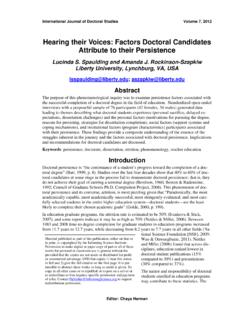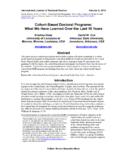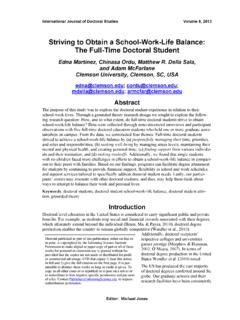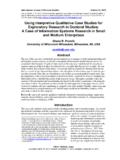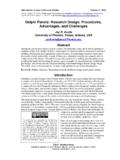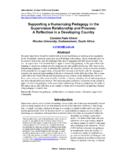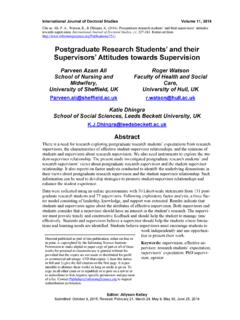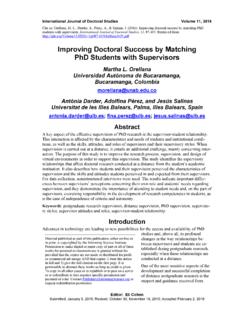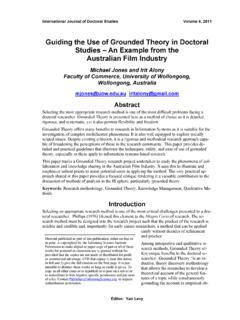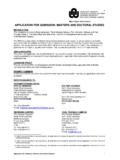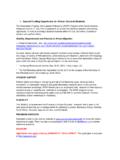Transcription of The Road to Doctoral Success and Beyond - Informing Science
1 International Journal of Doctoral Studies Volume 6, 2011 The road to Doctoral Success and Beyond Veronica Castro Educational Psychology Department, University of Texas-Pan American, Edinburg, TX, USA Elda E. Garcia Assessment and Accountability, Corpus Christi Independent School District, Corpus Christi, TX, USA Javier Cavazos Jr. Counseling and Educational Psychology Department, Texas A&M University-Corpus Christi, Corpus Christi, TX, USA Alma Y. Castro Sociology Department, University of Massachusetts-Amherst, Amherst, MA, USA Abstract The purpose of this study is to gain an understanding of the experiences of women that lead them to pursue a in Counseling, as well a study of their experiences in their Doctoral program. The goal of this study is to identify those factors related to women s academic Success . This study applies the resiliency and emotional intelligence (EI) framework to analyze the subjects' experi-ences.
2 Another construct related to EI and resilience, Antonovsky s (1987) theory of coherence, is employed to explain the way in which the subjects converted negative external factors into achievement motivation. A three and a half hour focus group, facilitated by an open-ended ques-tionnaire, was audio-recorded, transcribed, and analyzed independently by the four researchers. The results found two overarching themes, consistent with previous research by Amini et al. (2008): (a) attributes, attitudes, and motivation and (b) extrinsic supportive factors. Another theme uncovered in this study was the impact of (c) negative external factors. The paper con-cludes with a discussion of these findings, suggestions for future research, and ideas for ways in which Doctoral programs and faculty can promote the Success of female Doctoral students. Keywords: resiliency, academic achievement, women, Doctoral students, sense of coherence Material published as part of this publication, either on-line or in print, is copyrighted by the Informing Science Institute.
3 Permission to make digital or paper copy of part or all of these works for personal or classroom use is granted without fee provided that the copies are not made or distributed for profit or commercial advantage AND that copies 1) bear this notice in full and 2) give the full citation on the first page. It is per-missible to abstract these works so long as credit is given. To copy in all other cases or to republish or to post on a server or to redistribute to lists requires specific permission and payment of a fee. Contact to request redistribution permission. Introduction Recent statistics illustrate that more women than men are enrolled in higher education institutions ( Department of Education, 2009). Historically, more men had always been enrolled in univer-sities. Beginning in 1980, women began to outnumber men in universities ( Department of Education, 2009). What Editor: Victoria Wise road to Doctoral Success does this upsurge of women in education indicate?
4 What helps women become academically re-silient? Do resilient women need a supportive environment, community support, and/or school support in order to achieve academic Success ? Despite the academic progress of women in the , fewer women complete professional and Doctoral degrees, as compared to men ( Bureau of the Census, 2009a, 2009b). While women have higher graduation rates than men at most levels of education, the trend ends at the master s degree. After the master s degree, there is a one and half percent difference between genders in completion of Doctoral degrees, with men in the lead ( Bureau of the Census, 2009a, 2009b). Approximately 672,000 fewer women than men complete a Doctoral degree ( Bureau of the Census, 2009a, 2009b). Further investigations into the demographics of the women who complete Doctoral degrees indicate that minority women represent a very small percentage. For example, Latina women represent only 4% of total women obtaining a Doctoral degree ( Bureau of the Census, 2009a, 2009c).
5 Thus, women, especially minority women, have greater obstacles to doc-toral educational attainment (Gardner, 2008). An exploration of women s history in education reveals that women have had to fight for their right to attain Doctoral degrees in all fields (Weiler, 1989). Other studies have highlighted wom-en s caretaker responsibilities, financial constraints, and lack of guidance as obstacles to obtain-ing advanced degrees (Eitel & Martin, 2009; Heenan, 2002). In regard to socialization, academic structures, conventions, and traditions are typically not designed to allow [graduate/ Doctoral ] stu-dents with children, whose schedules and responsibilities are often demanding, much flexibility (Gardner, 2008, pp. 133-134). Thus, challenges for women to complete their Doctoral require-ments abound. As Curtis (2005) noted, legal, formal, and visible hurdles have been largely, though not entirely, removed, leaving in their stead more subtle structural disadvantages: forms of bias and discrimination that could almost be characterized as unconscious or unintended (p.)
6 1). While women have had greater access to education, there still seem to be obstacles that hinder their educational Success . So, what experiences and/or characteristics help women succeed or persevere in higher educa-tion? The researchers conducted a focus group of women enrolled in a Doctoral counseling pro-gram in order to determine the factors, experiences, and/or characteristics pertinent to their entry- and exit-level Doctoral Success . One way to understand what has led to these women s Success is to utilize the resiliency theoretical framework. Therefore, the resiliency construct was utilized to analyze the data. While there has been extensive research on resiliency, few studies have focused on the factors, life events, or personal characteristics that have led women to become successful in Doctoral programs (Gardner, 2008). Why is this type of research important? Statistics indicate that women, especially ethnic minori-ties, are less likely to obtain a professional/ Doctoral degree despite higher enrollment ( Bu-reau of the Census, 2009a, 2009c; Department of Education, 2009).
7 This indicates that women are at greater risk for graduate school/ Doctoral program attrition. In fact, a study on attrition rates by the Council of Graduate Schools (CGS) (2008) found that the attrition rate for women enrolled in programs is higher than men. So, in spite of the advancement of wom-en in education, they are less likely to reach the ivory tower. Professionals in higher education, like most professionals, are held to ethical standards. Accord-ing to the ethical principles and standards of American College Personnel Association (ACPA) College Student Educators International (American College Personnel Association, 2006), educa-tors in higher education should enhance the worth, dignity, potential, and uniqueness of each individual within post-secondary educational institutions ( ). This statement speaks to the eth-ical principle of responsibility to society. Advocacy, especially for minority populations like His-52 Castro, Garcia, Cavazos, & Castro panic women, is one way educators can be ethically responsible.
8 For this reason, attrition of fe-male Doctoral students should be an important issue for Doctoral program faculty. While some research has focused on the characteristics of individuals who are academically suc-cessful, few have focused on the unique experience of the women who reach the highest level of academic achievement (Gardner, 2008). Therefore, the purpose of this study was to identify char-acteristics and general themes of resiliency among female Doctoral students. Thus, the guiding research questions in this study were, How do women in a counseling program understand and perceive their reason for academic Success ? and Are there unique resiliency characteristics in women who pursue a Doctoral degree? Specifically, the researchers were interested in the women s (a) school experience, (b) percep-tions of the impact of mentors on their academic achievement, (c) perceived barriers to educa-tional attainment, and (d) significant life events that contributed to their academic Success .
9 The purpose of this study was to provide insight into these questions and reveal factors that allowed these women to succeed in their pursuit of higher education. This type of research may allude to characteristics needed for women to succeed in Doctoral programs. Results of this research can also have implications for how graduate programs are structured in order to ensure optimal ma-triculation rates. This article provides a literature review that focuses on resiliency and related constructs. Second, findings from personal interviews with seven female Doctoral students are introduced. Lastly, a discussion regarding the importance of these findings is provided and implications for practice and research are offered. Literature Review The interest in factors that provide strength in individuals can be traced back to Indian Buddhism, Chinese medicine, and ancient Greece and Rome (Strumpfer, 2005). Strumpfer (2005), borrowing from Antonovsky s (1979) term fortology, calls this line of study, psychofortology.
10 This term translates to the origins of strength. While many different fields have contributed to the study of strength in individuals, the field of resiliency is one of the most prominent. Nevertheless, other fields studying psychofortology will be reviewed, as they add depth to the discussion of the cur-rent study. Resiliency Resiliency is defined as the ability to cope with adversity and overcome the most challenging circumstances (Hassinger & Plourde, 2005, p. 319). Academic resilience is the ability to achieve in an educational setting despite exposure to risk factors (Morales, 2008). McMillan and Reed (1994) contend that positive interpersonal and individual factors play a role in developing aca-demic resiliency. Examples of positive interpersonal relationships include high expectations from family and/or mentor support. Familial support in academic Success is best exemplified in parents who hold high educational expectations and provide their children with the encouragement to pursue those expectations (McMillan & Reed, 1994).
